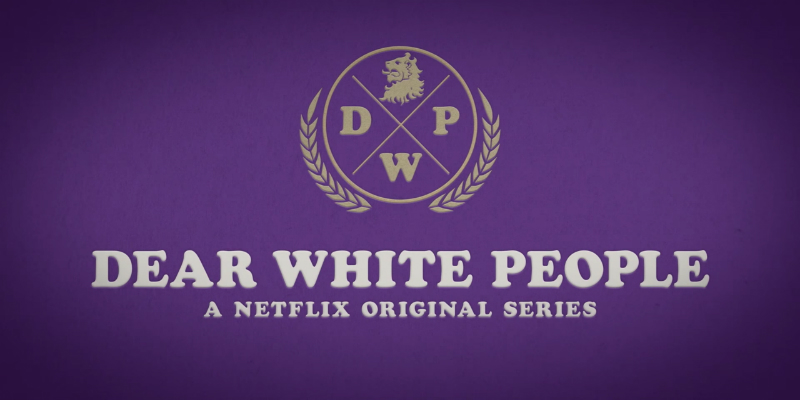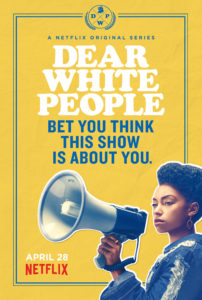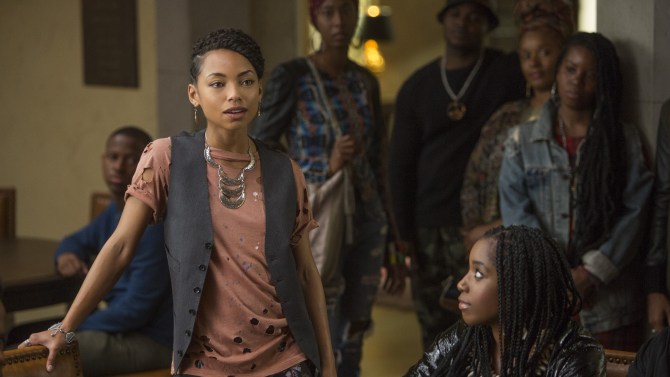
Dear White People Advanced Review
Created By: Justin Simien
Starring: Logan Browning, Brandon P Bell, DeRon Horton, Antoinette Robertson, Marque Richardson, Ashley Blaine Featherson, John Patrick Amedori
A review by Samantha Pearson
 The new Netflix series Dear White People both is, and is not, a direct continuation of the 2014 film of the same name. Both were created by Justin Simien, who originally began drafting the film in 2007 during a much different political climate in the United States. The film was funded by his tax return and a $40k online fundraiser.
The new Netflix series Dear White People both is, and is not, a direct continuation of the 2014 film of the same name. Both were created by Justin Simien, who originally began drafting the film in 2007 during a much different political climate in the United States. The film was funded by his tax return and a $40k online fundraiser.
Just three years later, Dear White People the series has already made waves, and it doesn’t even stream until April 28.
The series picks up immediately after Winchester University’s on-campus humor magazine hosts a blackface party for Halloween, which is the culminating event of the film. However, setting aside cast changes, Netflix’s Dear White People takes more time with plots that felt rushed in the original film, fleshes out characters that were otherwise blandly stereotyped, and provides televised drama and comedy that can only come in the form of a series. Gone is Coco’s YouTube series, the reality TV casting director, Troy’s white girlfriend and Lionel’s creepy Bugle editor trying to use “diversity” as a means of getting in his pants.
Presumably, if you watch the film and immediately watch the Netflix series, you can follow all of these events as one continuous timeline with little trouble. The series retcons several things that needed more development, though, which makes it somehow even better. These changes require some mental rewriting from the audience, if they opt to watch the film and then the series.
Honestly, as much as I loved the original film, I think the series can and should be watched on its own. As a separate entity, it grips the audience by the lapels and doesn’t let go. I watched all ten episodes in less than a day. At the end of the finale, I only wanted more.
Dear White People follows the aftermath of Pastiche Magazine’s blackface Halloween party, which is broken up by several members of the Black Student Union. The party and its fallout are used as a jumping-off point for radicalization of black students at the predominately white, Ivy League Winchester University (a fictional representation of predominately white universities literally everywhere).

The BSU is headed by biracial media studies major Samantha White, a junior, who uses her radio show “Dear White People” to address issues of racial inequality on the university campus. She does so with biting humor and a desire to make her voice — and the voices of other black students — heard loud and clear.
Sam’s radio show is considered “divisive” by university faculty, including the dean of students (a black man, whose son is running to become the first black student body president in Winchester’s history). The pilot episode of the show focuses on her, with each episode after focusing on a different character.
Following in the footsteps of fellow Netflix series Orange Is the New Black, Dear White People is structured to introduce us to each of the major players in the series by focusing episodes on individuals and how they relate to the group. Key events are revealed through multiple points of view, creating a significantly more fleshed-out watching experience than the film was able to accomplish.
This series focuses on the fact that we live in a racist society, unapologetically calling out white supremacy in every single episode. The show deals directly with police brutality, socioeconomic inequality, drug culture, interracial relationships, light-skinned privilege, colonization, language, bodily autonomy, and assimilation.
It also, like any good dramedy, explores interpersonal relationships, sexuality, and ideological differences, all without pulling focus from the terror of being a black person in the United States in 2017.
It also manages all of this against the backdrop of a fictionalized Ivy League university, where presumably the students are educated enough to understand that going to a blackface party is racist as fuck. But don’t forget — educated people, especially white women, ultimately elected Donald Trump.
It’s 2017 and a series like Dear White People has to exist to address the continued systemic oppression of black people, even in an Ivy League environment. That’s absolutely horrifying.
Watching this series as a white person was a particularly interesting experience. I found myself recognizing and understanding most of the intricacies of the series from other media I’ve consumed, as well as from following the news, reading personal essays, and listening to people of color talk about their experiences. But it hit me at some point in every episode that I will never truly understand these intricacies because I come from a place of white-skinned, working class privilege.
I think that, more than anything, makes Dear White People a series that everyone should watch, regardless of skin color or socioeconomic background. It’s accessible, smart, sharp, poignant, well-written and well-acted. It breaks down issues that black people face every single day and forces them to the forefront of everything without apology, giving it an incredible amount of power for a 10-episode series that has less than 30 minutes per episode.
The Verdict
WATCH IT! Dear White People is a quick watch that sucks you right in and the content is relevant, important, and incredibly well done. I can’t recommend it enough, seriously. Don’t sleep on this series!
Dear White People season one will be available to stream April 28, 2017 on all regions of Netflix.




2 thoughts on “Dear White People Advanced Review”